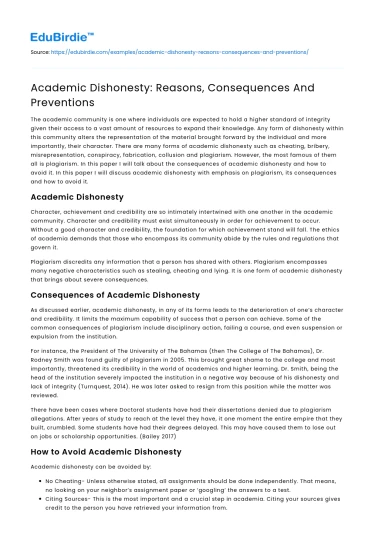The academic community is one where individuals are expected to hold a higher standard of integrity given their access to a vast amount of resources to expand their knowledge. Any form of dishonesty within this community alters the representation of the material brought forward by the individual and more importantly, their character. There are many forms of academic dishonesty such as cheating, bribery, misrepresentation, conspiracy, fabrication, collusion and plagiarism. However, the most famous of them all is plagiarism. In this paper I will talk about the consequences of academic dishonesty and how to avoid it. In this paper I will discuss academic dishonesty with emphasis on plagiarism, its consequences and how to avoid it.
Academic Dishonesty
Character, achievement and credibility are so intimately intertwined with one another in the academic community. Character and credibility must exist simultaneously in order for achievement to occur. Without a good character and credibility, the foundation for which achievement stand will fall. The ethics of academia demands that those who encompass its community abide by the rules and regulations that govern it.
Save your time!
We can take care of your essay
- Proper editing and formatting
- Free revision, title page, and bibliography
- Flexible prices and money-back guarantee
Plagiarism discredits any information that a person has shared with others. Plagiarism encompasses many negative characteristics such as stealing, cheating and lying. It is one form of academic dishonesty that brings about severe consequences.
Consequences of Academic Dishonesty
As discussed earlier, academic dishonesty, in any of its forms leads to the deterioration of one’s character and credibility. It limits the maximum capability of success that a person can achieve. Some of the common consequences of plagiarism include disciplinary action, failing a course, and even suspension or expulsion from the institution.
For instance, the President of The University of The Bahamas (then The College of The Bahamas), Dr. Rodney Smith was found guilty of plagiarism in 2005. This brought great shame to the college and most importantly, threatened its credibility in the world of academics and higher learning. Dr. Smith, being the head of the institution severely impacted the institution in a negative way because of his dishonesty and lack of integrity (Turnquest, 2014). He was later asked to resign from this position while the matter was reviewed.
There have been cases where Doctoral students have had their dissertations denied due to plagiarism allegations. After years of study to reach at the level they have, it one moment the entire empire that they built, crumbled. Some students have had their degrees delayed. This may have caused them to lose out on jobs or scholarship opportunities. (Bailey 2017)
How to Avoid Academic Dishonesty
Academic dishonesty can be avoided by:
- No Cheating- Unless otherwise stated, all assignments should be done independently. That means, no looking on your neighbor’s assignment paper or ‘googling’ the answers to a test.
- Citing Sources- This is the most important and a crucial step in academia. Citing your sources gives credit to the person you have retrieved your information from. It erases any allegations that may be brought against you for using someone’s work.
- Utilize Writing Centre’s- Professionals stationed at a Writing Centre are ready, willing and able to assist you with your work. The can assist you in avoiding plagiarism and show you how to properly cite sources.
- Paraphrase- One of the most convenient ways to avoid plagiarism is to paraphrase—express something already written using your own words.
- Use Plagiarism Checkers- There are many websites that check for plagiarism such as Scribbr, Plagscan, Grammarly and TurnItIn. They will analyze your work to ensure that you have not copied someone else’s material.
- References- In addition to citing your sources, referencing them allows others to find where the article, website, magazine, etc, that you got your information from is located.
Conclusion
The simplest form of academic dishonesty, whether intentional or unintentional can have the greatest impact. The academic journey must be centered around the core values of integrity, honesty and fairness. It is important to avoid being dishonest in academia because it diminishes the value of your work—past, present and future. It also challenges your character and your ability to accomplish a task with your own knowledge and skills.
Academic dishonesty doesn’t only impact the person committing the act, it also has a negative effect on the institution the person attends. It is important to avoid engaging in all forms of academic dishonesty. Your character, credibility and success all depend on your morals. Academic institutions must hold true to their standards and values in order to maintain their credibility. This includes evicting anyone who goes against these values. Truth and integrity take precedence in academia. It is better to fail honestly with your integrity intact than to succeed by cheating the rules.
Works Cited
- Turnquest, A. (2014, August 21). The Tribune. Retrieved November 14, 2018, from http://www.tribune242.com/news/2014/aug/21/smith-chosen-cob-president-after-accepting-plagiar/
- Ways to Avoid Plagiarism. (n.d.). Retrieved from http://en.writecheck.com/ways-to-avoid-plagiarism
- Bailey, J. (2017, February 7). Academic Plagiarism, Real Courts. Retrieved November 21, 2018, from https://www.plagiarismtoday.com/2017/02/07/academic-plagiarism-real-courts/






 Stuck on your essay?
Stuck on your essay?

